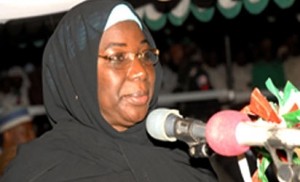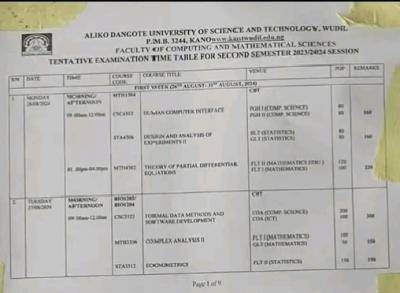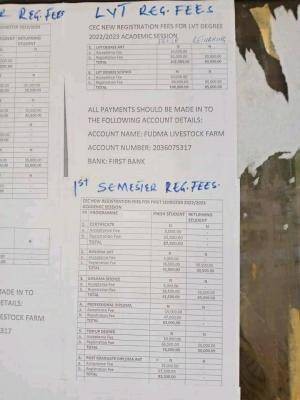
Youths in the North under the aegis of Association of Northern Youths for the Advancement of Peace, Harmony and Development have asked the Minister of Education, Prof. Ruqayattu Rufai, and her Labour and Productivity counterpart, Emeka Wogu, to resign for their inability to resolve the long-standing trade dispute between university lecturers and the Federal Government.
The youth accused the two ministers of failing to protect the interests of students.

In a statement signed by the President, Mr. Melvin Ejeh, in Jos on Friday, the they said by allowing the trade dispute to linger, the two government functionaries had failed in their duty and had no justification to remain in office.
The youth said in the event that they failed to heed the advice, they would have no alternative but to embark on mass action to force them to leave office.
The statement read, “The ongoing strike of the Academic Staff Union of Universities is a complete show of incompetence and lack of respect for the future of Nigerian students. We have watched with utmost dismay the manner in which the government and its agents have been handling the issues of Nigeria’s most important community-the academic community.
“We are aware that most of these public officers enjoyed free education and even got automatic employments. We wonder why they are adamant about ASUU and students’ plights since 2009.”
While urging President Goodluck Jonathan to take necessary steps to make sure that the lecturers go back to work, they also asked him to sack the two ministers in the event that they failed to resign.
Meanwhile, educationists have called on the Federal Government to accede to the demands of the Academic Staff Union of Universities so that the union can call off its strike.
A former lecturer at the University of Lagos, Prof. Lai Olurode, told SUNDAY PUNCH on Friday that the nation’s education system was in a poor state because the Federal Government had neglected its duties.
Olurode said, “The current state of our universities is nothing to speak about. Lecturers are teaching under terrible conditions and students too are being subjected to learning under harsh conditions. I’ve taught for 40 years in various institutions and each time I see the state of our universities, I cry. Yet the Federal Government is building more universities.”
Olurode warned that if ASUU stopped performing its core duties, the nation’s education system would be affected.
“With the help of ASUU’s strikes, so many mishaps in the education sector have been corrected. If we all fold our arms and keep quiet, the government would do as it pleases,” he said
Buttressing Olurode’s view, Prof. Poju Akinyanju of the Department of Biology, University of Ilorin, said the strike was a legal action that needed no apology.
“Workers should never be apologetic for going on strike. Strike is a legal and legitimate weapon to address obdurate and insensitive employers who resist non-strike mode of crisis resolution. ASUU enumerated the numerous efforts it made to avert a strike that were rebuffed by the government.”
Akinyanju added that the government was to blame for the fallen education standard.
He said, “Recall that the teachers in primary and secondary schools in many states have been on strike for weeks over non-implementation of an agreement reached over three years ago. What one can deduce is that our ruling class does not want education for our children as they treat teachers at all levels with contempt.”
Reacting to previous claims that UNILORIN had excluded itself from the strike, Akinyanju said the report was false.
“ASUU has successfully waged struggles without the participation of UNILORIN; it will succeed in the current struggle without the participation of a university that has isolated itself from the community of Nigerian universities,” he said.
Also, a development educationist, Mr. Peter Ogudoro, has said education is the bedrock of development and that the philosophy of education in the country needs to be changed.
He said, “The problem in the education sector is a deliberate attempt by those in power to ensure that the poor man does not move up. A large percentage of our leaders know the right thing to do.
“They know what we need to revive our education sector, but they have chosen not to do anything. The strike is an unfortunate situation but it needs to be done.”
For the past decade, academic staff of Nigerian universities have been at daggers drawn with various federal administrations over the 2002 agreement reached with them.
Last Monday the lecturers went on strike for the umpteenth time to press home their demands for the implementation of the said agreement.




